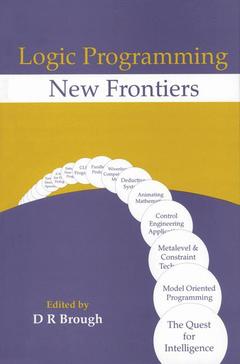Description
Logic Programming New Frontiers, Softcover reprint of the original 1st ed. 1992
Coordinator: Brough D.R.
Language: English
Publication date: 11-2012
310 p. · 15.5x23.5 cm · Paperback
310 p. · 15.5x23.5 cm · Paperback
Description
/li>Contents
/li>
In Logic Programming, as in many other areas, Theory is often best tested by Application and attempted Application frequently necessitates advances in Theory, so both theoretical and practical work is essential for effective progress. This is clearly evident in the following papers presented to the sec ond UK Logic Programming Conference which was sponsored by the United Kingdom branch of the Association of Logic Programming and convened at Bristol.University in March 1990. This book contains 13 papers from that conference grouped under four head ings: Theory supporting practice motivating theory In this first group of papers, difficulties experienced in practical application of Prolog and in debugging Prolog programs have motivated work on extensions to the language and its development environment. Program development advances are represented by two papers on debugging and one on a development methodology for CLP programs. On the theoret ical side a Pure(r) logic language is proposed as well as extensions to make logic more effective for integrity checking in deductive databases. Applications The next group contains three papers. The first describers the use of Prolog to develop a Control Engineering workStation (CES). The second investigates the use of a logic programming based KBMS for developing a prototype Fi nancial Management Information System. In the last it is shown how a subset of prolog can provide a vehicle for the animation of Discrete Mathematics.
1. Metalevel and Constraint Technology in a Pure Logic Language.- 2. A Framework for the Principled Debugging of Prolog Programs: How to Debug Non-Terminating Programs.- 3. Event Abstraction Debuggers for Layered Systems in Prolog.- 4. Extending the Integrity Maintenance Capability in Deductive Databases.- 5. Construction of CLP Programs.- 6. Some Control Engineering Applications of Prolog.- 7. GAP: An Experiment in Model Oriented Programming.- 8. Using Prolog to Animate Mathematics.- 9. Term-Encodable Description Spaces.- 10. Logic, Language and the Quest for Intelligence.- 11. A Model for OR-Parallel Prolog Execution Using Graph Reduction.- 12. Reconciling Systems and Deductive Capacities in Knowledge Based Systems Using Logic Programming.- 13. The Wivenhoe Computational Model: In Search of More Parallelisms.
© 2024 LAVOISIER S.A.S.
These books may interest you

Logic Programming with Prolog 42.19 €



